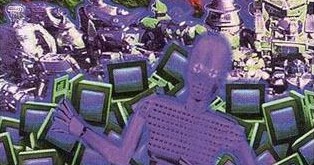Frisky's Corner
by Frisco Del Rosario
Take out the papers and the trash
Do you spend enough time deciding what to discard? I think trash management
is an overlooked aspect of NetRunner play.
The first thing to understand about your discard pile is that
it is easily recycled. Gideon's Pawnshop, Junkyard BBS, and Off-Site
Backups are low-cost retrievers of single cards. The runner can
pay three bits for MIT West Tier, and shuffle his hand and discard
pile together. If the corporation scores the AI Chief Financial
Officer agenda, he gains the ability to take one action to shuffle
the central forts together. AI CFO's ability to recycle trash and
reshuffle is so powerful that InQuest magazine called it the "Card
to Get" in NetRunner.
Off-Site and Gideon's extend the usefulness of your other cards
by allowing them all to be played more than once, but without having
to include multiples in your deck. Gideon's Pawnshop should give
the runner the courage to take ice damage -- go ahead and force
the corp to rez Code Corpse, for the vital cards in your hand can
be salvaged.
Just because it's easy to fetch cards from the discard pile, it
doesn't mean you can choose your discards haphazardly. When the
need arises for a certain card which you've already thrown away
by choice, it is very frustrating -- it is even more annoying if
the card you kept in its stead never came into play.
The state of the game before you is always the best guide to selecting
discards. Correctly sizing up the contest will make your discarding
choices less painful, and it will also help you make best use of
cards which permit you to draw extra cards -- Crash Everett, Inventive
Fixer is an excellent resource in the hands of a runner who recognizes
trash when he sees it. Furthermore, you will find that you don't
have to include as many hand size expansion cards in your deck,
leaving room for power cards.
The agenda score often influences choice in discard. When the
corporation reaches six agenda points, it's safe for the runner
to throw away Terrorist Reprisal. Before the runner achieves six
agenda points, Blackmail is expendable, but after the makes reaches
six, all the bonus preps like Prearranged Drop and Desperate Competitor
become disposable. The corporation, similarly, can easily trash
Trojan Horse and Silver Lining Recovery Protocol.
I am far more likely as runner to trash a Corporate Ally if I
have not scored an agenda point. Same goes Arasaka Portable Prototype,
but who plays with that? (what an expensive card).
Concealment is another consideration in choice of discard. Just
because you have two of the same card in your hand does not make
it an obvious discard. If I am holding two Technician Lovers, I
will not discard one until I am ready to run RD.
Keep in mind a card's ability in relationship to the time of game.
Early in the game, I will considering keeping two code gate breakers
in hand, if one is Dupre. Dupre installed fast and pumped on a small
code gate is a long-term strength. Misc.for-sale pays best when
you have had time to install many cards, and is therefore a fair
choice to pitch early.
Late in the contest, Floating Runner BBS is a goner, because the
game might not last the seven turns Floating needs to start returning
a profit. Same goes for all the cards like it -- Rigged Investments,
Holovid and Braindance Campaigns, Spinn, Streetware, etc. (Similar
thinking applies to whether you should load a previously-installed
Spinn or Streetware, or cash out a Broker.) The Detroit Police Contract
agenda (a "Campaign" agenda) loses a lot of its value late in the
game, and is an easier agenda to trash than others. Political Overthrow
and other high-difficulty agenda can be discarded in a pinch, when
there's no time to score them.
Early in the game, I bet it is more convenient to ditch a memory
chip than a daemon. When there is plenty of available MU in which
to install a daemon, the daemon may provide all the extra memory
that is needed, plus it is cheaper to install. Later, there might
be no room for the daemon, and a chip is needed.
As ever, keep an eye on your opponent's bit pool. Runners can
painlessly toss Weather-to-Finance Pipes and Forged Activation Orders
when the corporation can easily afford their effects. The corporate
player makes such decisions every time he draws a piece of ice --
when the runner has icebreakers installed, it's simple to pass judgment
on a Sleeper.
Where your own bit pool is concerned, let the state of the game
guide you. If you feel like discarding AI Boon because you think
you're on a Loony Goon budget, check the agenda tally -- if the
score is tied at zero, you're probably wiser to plan for a long
term, and save bits for Boon. However, if you have to run now, chuck
the Boon, and keep the Goon.
|

